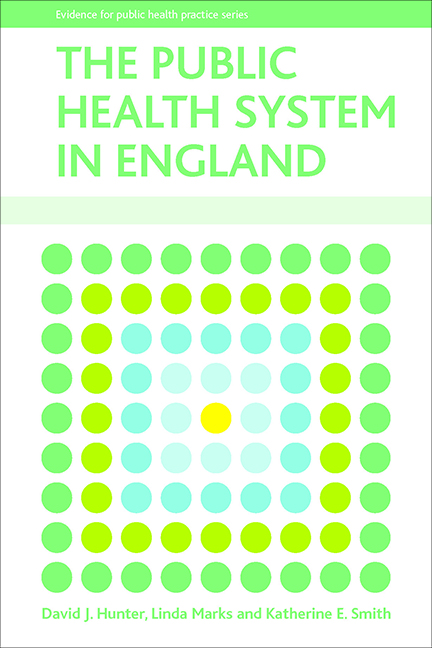Book contents
- Frontmatter
- Contents
- List of boxes and figures
- Acknowledgements
- List of acronyms
- About the authors
- one Introduction
- two Public health and a public health system
- three The evolution of the public health function in England (1): 1974–97
- four The evolution of the public health function in England (2): 1997–2009
- five Current issues in the public health system in England
- six Looking to the future
- Appendix: NHS reorganisation – 1975–2009
- References
- Index
five - Current issues in the public health system in England
Published online by Cambridge University Press: 01 September 2022
- Frontmatter
- Contents
- List of boxes and figures
- Acknowledgements
- List of acronyms
- About the authors
- one Introduction
- two Public health and a public health system
- three The evolution of the public health function in England (1): 1974–97
- four The evolution of the public health function in England (2): 1997–2009
- five Current issues in the public health system in England
- six Looking to the future
- Appendix: NHS reorganisation – 1975–2009
- References
- Index
Summary
The last two chapters described the changing public health landscape in England between 1974 and 1997 and post-1997 respectively, noting the key policy and other milestones in this journey as far as these have shaped and impacted on the direction of policy and the composition and configuration of the public health workforce. Such a period of intense activity, especially since 1997, has inevitably resulted in a range of issues and themes that remain alive and largely unresolved. They are explored further in this chapter and are all matters that are influencing an evolving public health system in one form or other, ultimately determining its ability to deliver. The issues on which we focus in this chapter are as follows:
• the nature of policy formation relating to the health of the public;
• markets, competition and choice;
• commissioning for health and wellbeing;
• public health through partnership;
• public involvement.
The remainder of the chapter is structured around these issues and we draw on our interview material to illustrate each as appropriate.
The nature of policy formation relating to the health of the public
A key tension to emerge from our review of the state of the public health system in England is the lack of certainty and agreement about what the thrust of public health policy is, where responsibility for promoting the health of the public across the wider public health system lies and how much importance is attributed to the impact on health of policies in other sectors.
One means of ensuring policy makers from a wide variety of sectors are sufficiently aware of the health consequences of their policies, currently being promoted by the WHO (2008d), is health impact assessment (HIA). It is a key component of the Health in All Policies (HiAP) strategy adopted by the EU to inform its health strategy (see Chapter Two). The intention of those advocating for HIA to be undertaken across government in the UK is that it provides a means of ensuring potential health impacts are taken into account in all policy decisions, not merely those emanating from the Department of Health. Theoretically, this could help ensure central government provides a more coherent policy steer on public health issues. However, concerns have been raised about whether HIA, which was originally developed to assess local health impacts, can be effectively adapted to national policy-making levels (Hübel and Hedin, 2003; Davenport et al, 2006).
- Type
- Chapter
- Information
- The Public Health System in England , pp. 103 - 148Publisher: Bristol University PressPrint publication year: 2010



